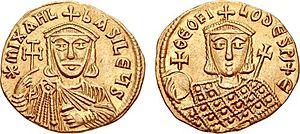| Millennium: | 1st millennium |
|---|---|
| Centuries: | |
| Decades: | |
| Years: |
|
| Gregorian calendar | 820 DCCCXX |
| Ab urbe condita | 1573 |
| Armenian calendar | 269 ԹՎ ՄԿԹ |
| Assyrian calendar | 5570 |
| Balinese saka calendar | 741–742 |
| Bengali calendar | 227 |
| Berber calendar | 1770 |
| Buddhist calendar | 1364 |
| Burmese calendar | 182 |
| Byzantine calendar | 6328–6329 |
| Chinese calendar | 己亥年 (Earth Pig) 3516 or 3456 — to — 庚子年 (Metal Rat) 3517 or 3457 |
| Coptic calendar | 536–537 |
| Discordian calendar | 1986 |
| Ethiopian calendar | 812–813 |
| Hebrew calendar | 4580–4581 |
| Hindu calendars | |
| - Vikram Samvat | 876–877 |
| - Shaka Samvat | 741–742 |
| - Kali Yuga | 3920–3921 |
| Holocene calendar | 10820 |
| Iranian calendar | 198–199 |
| Islamic calendar | 204–205 |
| Japanese calendar | Kōnin 11 (弘仁11年) |
| Javanese calendar | 716–717 |
| Julian calendar | 820 DCCCXX |
| Korean calendar | 3153 |
| Minguo calendar | 1092 before ROC 民前1092年 |
| Nanakshahi calendar | −648 |
| Seleucid era | 1131/1132 AG |
| Thai solar calendar | 1362–1363 |
| Tibetan calendar | 阴土猪年 (female Earth-Pig) 946 or 565 or −207 — to — 阳金鼠年 (male Iron-Rat) 947 or 566 or −206 |

Emperor Michael II and his son Theophilos
Year 820 (DCCCXX) was a leap year starting on Sunday (link will display the full calendar) of the Julian calendar.
Events
By place
Byzantine Empire
- December 25 – Emperor Leo V (the Armenian) is assassinated by conspirators in the Hagia Sophia, at Constantinople. Though unarmed, he fights back fiercely but dies of his wounds. He is succeeded by Michael II, the commander of the palace guard (excubitores). Leo's family (including his mother and his wife Theodosia) are exiled to monasteries in Princes' Islands.[1]
Ireland
China
- Emperor Xian Zong dies from poisoning (due to medicines), after a 14-year reign. He is succeeded by his son Mu Zong, as ruler of the Tang Dynasty.
Births
- Adalbert I, Frankish margrave (approximate date)
- Adelaide of Tours, Frankish noblewoman (approximate date)
- Álmos, military leader (gyula) of the Hungarians (approximate date)
- Anandavardhana, Indian philosopher (d. 890)
- Ashot I ("the Great"), king of Armenia (approximate date)
- Buhturi, Syrian poet (d. 897)
- Godfrid Haraldsson, Danish Viking king (approximate date)
- Grimbald, Frankish Benedictine monk (d. 901)
- Hucbert, Frankish nobleman (d. 864)
- Ibn Khordadbeh, Persian geographer (approximate date)
- Qusta ibn Luqa, Syrian Melkite physician (d. 912)
- Ranulf I of Aquitaine, Frankish nobleman (d. 866)
- Rhodri the Great, king of Gwynedd (Wales) (approximate date)
Deaths
- September 14, Li Yong, chancellor of the Tang Dynasty
- December 25, Leo V, emperor of the Byzantine Empire (b. 775)
- Adi Shankara, Indian philosopher and theologian (b. 788)
- Causantín mac Fergusa, king of the Picts[2]
- Huangfu Bo, chancellor of the Tang Dynasty
- Lupo III, duke of Gascony (approximate date)
- Muhammad ibn Idris al-Shafi‘i, Muslim imam (b. 767)
- Olcobhar mac Cummuscach, abbot of Clonfert
- Song Ruoxin, Chinese scholar and poet (b. 768)
- Tnúthgal mac Donngaile, king of Munster
- Tutu Chengcui, eunuch and advisor of the Tang Dynasty
- Wang Chengzong, general of the Tang Dynasty
- Xian Zong, emperor of the Tang Dynasty (b. 778)